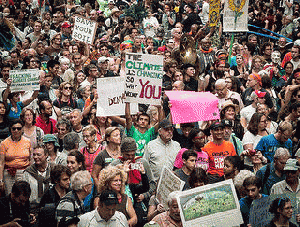Humans, as do all other living organisms, place a very high priority on their own self-interest, and on that of their immediate families. This is a natural consequence of evolution. However, as population increases, and technology becomes more pervasive and complex, it is becoming increasingly difficult for individuals to determine what behavior is most likely to best promote their interests.
Aside from purely altruistic considerations, unmitigated selfishness is seldom, if ever, a good strategy. With rare exceptions, we all live in complex societies, interacting in many ways with various organizations and individuals. Acting in ways detrimental to those around us will usually produce reactions counter to our own interests. At the very least, it will make it more difficult to get others to cooperate with us, even to promote common interests. The term, "solidarity", is often used to denote joining with others to promote common interests. It often motivates behavior helpful to others, with the general expectation that this will make it more likely that they will reciprocate at some later time.
Solidarity is a positive characteristic, in the sense that it denotes positive acts helpful to others in groups that we identify with, but not behavior detrimental to people not in such groups.
For the vast majority of people, there are many situations in which cooperation with others is essential. Where, as in our country, power is increasingly being concentrated in the hands of a very small group of super-rich people [1], ordinary people usually can't defend their interests effectively unless they cooperate with others. An obvious example of the value of people joining others to promote their common interests, is the labor union.
Labor unions
Solidarity, as applied to labor unions means that workers in a particular union act together to promote their common interest in their workplace. It also means that unions in different workplaces, even in different industries, cooperate. Of course, a good union will not make unreasonable demands that would jeopardize the viability of the employer's business.
Seven decades ago, American workers exhibited a considerable degree of solidarity in this respect, as more and more of them joined unions, and the unions generally cooperated with one another to achieve many benefits for working people. Over the past several decades, these gains have been largely erased by the near elimination of effective unions in private industry [2].
This, in large part, can be attributed to the virtual disappearance of solidarity among workers. Most people now think in terms of how they personally can get ahead, with no thought of joining with others to advance their common interests. Among other things, this attitude has made possible the election of governments that have created a legal atmosphere lethal to unions.
Existing unions, for the most part, are weak, and not very democratic. Most of the few remaining in the private sector are very weak; exceptions being a few craft unions (e.g., stage hands). Surviving unions are mainly in the public sector, are under attack, and tend not to be mutually supportive.
A good example of the weakness of American unions is the recent failure of the United Auto Workers to unionize a Volkswagen assembly plant in Tennessee. Despite the fact that, unlike American companies in similar situations, the German Company did not oppose unionization, local and state government, in conjunction with wealthy right-wingers, waged a well funded campaign sufficient to get the workers to vote 712-626 against the union [3].
In politics
Sad to say, solidarity is in short supply in the US today. The widespread attitude of focussing almost exclusively on one's own self interest makes it possible for a tiny, wealthy, minority to dominate a large population, via a divide and conquer strategy.
Instead of acting to support one another's efforts to improve earnings and working conditions, many workers, to the extent that they express their views, seem to resent any success of other workers, usually via unions, in bettering their conditions. The attitude seems to be that, if, for example, supermarket cashiers win a pay increase, this will come out of the pockets of other workers, rather than out of the profits of corporations.
Workers, as such, have virtually no effective voice in American politics. There is no labor party in the US. Those who identify themselves as liberals, and profess to support the interests of working people, tend to vote for Democrats. Almost all unions support the Democratic Party, despite the fact that, for decades, that party has done nothing to help workers and/or their unions. To the extent that they vote at all, a large proportion, perhaps a majority of blue-collar workers, vote for candidates with positions detrimental to workers. E.g., they support candidates opposed to a steeply graduated income tax (such as the system in effect six decades ago). This is, in part, because real supporters of workers' interests seldom appear on our ballots.
Cooperation with those close to us in some way, perhaps geographically, or ethnically, or in terms of occupation, is a step up from pure selfishness. But, if it implies hostility toward other legitimate groups or their members, it is a form of insularity rather than solidarity.
(Note: You can view every article as one long page if you sign up as an Advocate Member, or higher).





